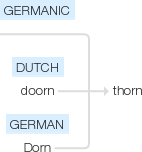Thorn
Old English, of Germanic origin; related to Dutch doorn and German Dorn .
wiktionary
From Middle English thorn, þorn, from Old English þorn, þyrn(“thorn”), from Proto-West Germanic *þornu, from Proto-Germanic *þurnuz, from Proto-Indo-European *tr̥nós, from *(s)ter-(“stiff”). Near cognates include West Frisian toarn, Low German Doorn, Dutch doorn, German Dorn, Danish and Norwegian torn, Swedish torn, törne, Gothic 𐌸𐌰𐌿𐍂𐌽𐌿𐍃( þaurnus). Further cognates include Old Church Slavonic трънъ(trŭnŭ, “thorn”), Russian тёрн(tjorn), Polish cierń, Sanskrit तृण(tṛ́ṇa, “grass”).
etymonline
thorn (n.)
Old English þorn "sharp point on a stem or branch," earlier "thorny tree or plant," from Proto-Germanic *thurnīn- (source also of Old Saxon, Old Frisian thorn, Dutch doorn, Old High German dorn, German Dorn, Old Norse þorn, Gothic þaurnus), from PIE *trnus (source also of Old Church Slavonic trunu "thorn," Sanskrit trnam "blade of grass," Greek ternax "stalk of the cactus," Irish trainin "blade of grass"), from *(s)ter-n- "thorny plant," perhaps from root *ster- (1) "stiff."
Figurative sense of "anything which causes pain" is recorded from early 13c. (thorn in the flesh is from II Corinthians xii.7). Also an Anglo-Saxon and Icelandic runic letter (þ), named for the word of which it was the initial (see th).
